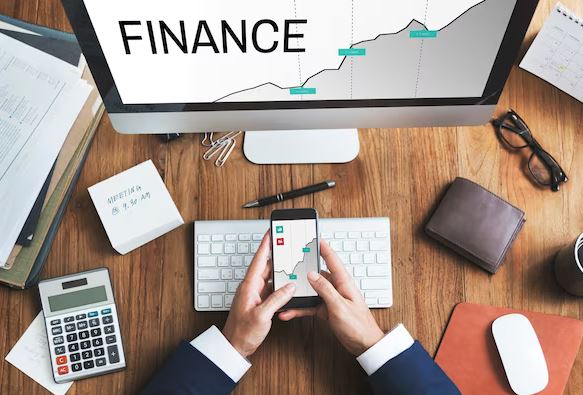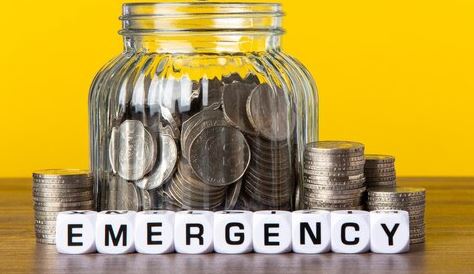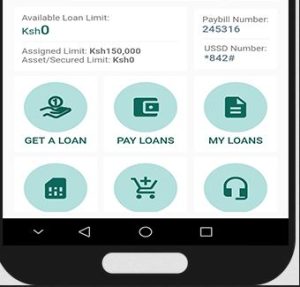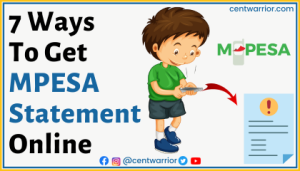What does it take to be financially free? I will say it’s one year of financial sacrifice! For Rich Dad Poor Dad author and businessman Robert Kiyosaki, ‘if you want to be financially free, you must become a different person than you are today and let go of whatever has held you back in the past.’
I call that sacrifice! Perhaps it’s debt, bad financial habits like compulsive gambling or drug addiction, or it could be an expensive lifestyle you cannot afford in the name of keeping up with the Joneses.
Whatever it is, it’s holding you back, and as Kiyosaki puts it, you’ve got to let it go. I’ll share just how you can do it in this video in a record one year.
I draw inspiration from one American lady by the name of Barbara Corcoran. If you are a fan of business reality TV shows, then you must have spotted her in the famous American business reality TV series Shark Tank.

The journey
While Barbara is financially loaded at present, she didn’t have a pleasant rise to the top. For starters, Barbara was born to a humble Irish family of 10.
Her mother was a home worker, and her father hopped from job to job. At some point, the family didn’t have enough to feed and had to rely on free food from a compassionate local grocer.
The dad even became a drunkard and even disrespected her mom. In school, Barbara was labeled ‘dumb’ by her classmates and teachers, which knocked her self-esteem off.
That, however, did not deter her self-drive and motivation to succeed and change the financial course for herself and her family. After flunking multiple courses, she eventually graduated with a degree in education, which allowed her to work as a teacher for a year.
By the time she was 23, the young Barbara had worked 20 jobs, including working as a waitress and receptionist. However, her biggest breakthrough came when she borrowed $1,000 from her then-boyfriend, which she used to start a small real estate company, the Corcoran Group, which she eventually turned into a $6 billion empire.
Today, she’s a millionaire investor and judge at Shark Tank and owns several businesses. She’s also the proud author of Shark Tales, a book that explains how she turned a $1,000 loan into a multibillion-dollar business.
So, why the story? Well, I think we must all make sacrifices to change our financial course today, and Barbara’s never-give-up attitude is a classic example of what it takes.
To emphasize that, I’ll discuss ten things you must do over the next 12 months to become financially free – one year of financial sacrifice eventually. Number 10 is the ultimate kicker!
1. Decide and Resolve to Change Your Life
They say insanity is doing the same thing repeatedly, expecting different results. You can’t make the same financial decisions each year and expect the financial course of your future to change for the better.
For example, you cannot continue operating without a budget and succumb to impromptu spending and expect to have something to save up. Similarly, you can’t expect to continue borrowing from one lender, pay another, and hope to break the heavy dark blanket called debt.
How about making financial resolutions at the beginning of the year that you never follow up on for the rest of the year?
It could be that you periodically resolve to start a side hustle, learn a new skill that could help your career, or cut back on some expensive habits but never live up to such resolutions.
In the end, all you are left staring at is a huge debt, a bucket of regret, and a never-ending blame game – bringing us to our second focus point.
2. Take Accountability for Your Bad Results
You can’t blame everyone for your financial shortcomings. We often blame our parents or guardians, spouses, friends, kids, or even the kiosk guy around the block for misappropriating funds, failing to save up, delaying our next project, and even getting into debt.
How about we start taking accountability for our bad results? That’s the only way to heal financially, rethink our missteps, and make better decisions in the future.
American naturalist John Burroughs states, ‘You can get discouraged many times, but you are not a failure until you start to blame somebody else and stop trying.’
I’m sure you wouldn’t want to count yourself a failure. Therefore, you have to stop blaming others and start owning up to every mistake.
Ask yourself this question, by Indian Author Amit Kalantri, ‘Would you like yourself if you met yourself?’
If the answer is No, then it’s time you start making amends by accounting for every bad result and going back to the drawing board to see where it all went wrong and how you can improve it this time.
That brings us to our next point: financial literacy.

3. Invest in Financial Literacy
American economist Alan Greenspan states, ‘The number one problem in today’s generation and economy is lack of financial literacy.’
So, what exactly is financial literacy? Why is it essential, or what are the effects of the lack of it?
Financial literacy, often used interchangeably with financial knowledge or financial education, refers to skills or knowledge that enable one to make more informed money decisions.
Financial literacy is essential in avoiding devastating financial mistakes such as accumulating colossal debt burdens, failing to save up, and lack of budgeting.
So, financial illiteracy is the lack of the ability to make informed financial decisions, and that’s what’s ailing us in Kenya.
For example, a 2021 Global Financial Literacy study expresses that only 38% of Kenyans are financially literate. But where does that leave the 62%?
Probably in the financially illiterate bracket, and that’s alarming. It’s due to financial illiteracy that many Kenyans succumb to poor spending, borrowing, CRB blacklisting, and housing foreclosure, among many other negative consequences.
What to do
You surely wouldn’t want to be a victim of financial illiteracy. Therefore, you’d have to invest in financial literacy, which you can do differently.
For instance, I like reading financial books by some of the most successful financial authors, such as The Total Money Makeover by Dave Ramsey, Rich-Dad Poor-Dad by Robert Kiyosaki, and Money: Master the Game by Tonny Robbins. I am also a fan of their podcasts.
So, perhaps that’s something you can try, but you don’t have to limit yourself to those three guys only. Also, consider other renowned bestselling financial book authors and podcasters such as Carl Richards, Benjamin Graham, David Bach, and T. Harv Eker.
However, podcasts and financial books are not the only sources of financial literacy you can invest in. You can also attend financial training, education camps, and workshops, take up a financial course to polish your financial skills, or subscribe to newsletters on financial blogs and websites.
You can also watch TV programs or listen to radio programs on financial education, and of course, don’t forget YouTube.
Remember these words by Robert Kiyosaki, the author I mentioned earlier, ‘money without financial intelligence is money soon gone.’ No matter how much you make, you will likely not keep hold of it without financial education.
Conversely, it takes financial literacy to turn a small paycheck into a working budget and eventually lasting wealth.
Let’s now talk about planning for your money, our next point.
4. Start Planning for Your Money – Budget! Budget! Budget!
I have mentioned the word budget thrice to emphasize its urgency. ‘A budget is telling your money where to go instead of wondering where it went,’ advises Total Money Makeover author Dave Ramsey.
The reality is that most of us find ourselves in a situation where we can’t account for how we’ve spent our money at the end of the month. Yes, we have a decent salary (which isn’t a lot, but just enough to live a decent life), but we still end up with unpaid bills and debt.
The problem, as Dave puts it, is the lack of budgeting. We fail to tell our money where to go. Since we don’t have a structure for intelligently using it, we spend it on anything that pleases our eyes or feels good at the tummy, and we are only left with regrets about what could have been or might have been if we had taken a better decision.
So, why don’t you start planning for your money? Remember, ‘money is only a tool. It’ll take you wherever you wish, but it’ll not replace you as the driver,‘ advised Russian-American philosopher Ayn Rand.
You’ve to take charge of your finances, starting with budgeting for every coin you make. You can use different budgeting methods to stay on top of your finances, such as the 60/40 budget, envelope system, 50/30/20 Rule, and pay-yourself-first.
My preference
My ultimate best is the Zero-Based budgeting system, where you assign a job or function to every coin you earn so that the difference between your income and expenses is zero. You can check out my new book, Budget Tracker, to learn about zero-based budgeting and how to track your budget and pay off your debt in record time.
The key takeaway is that the time to start budgeting is now, and it doesn’t matter how much you make.
5. Save For an Emergency Fund
Do you know why most people borrow or sell their most important assets for cheap when an unforeseen event happens? That’s because they fail to create a financial safety net they could fall back on, an emergency fund.
As the name suggests, an emergency fund gets you out of a financial emergency and saves you from borrowing or selling something you’ll regret later. Remember, we are not talking about buying the latest smartphone or car, going on a vacation, or treating God knows whom to please them or gain a favor.
No! We are talking about real emergencies such as a medical bill, an unforeseen travel, a car breakdown in case you drive, or a leaky roof that you must fix, among others.
An emergency fund also comes to your rescue when you lose your job; in such a case, it caters to your basic livable expenses. Therefore, I recommend setting up a fund that equals 3 – 6 months of household living expenses.
At least, that’ll give you more wiggle room to secure another income source before your emergency fund runs out. Of course, it’s not cast in stone. You could stash more funds in your emergency fund; it doesn’t have to be 3 –6 months of living expenses.
To ensure you use the emergency fund for what it’s supposed to be used for, you can set up a new savings account specifically for emergencies. This should be different from your regular savings.

6. Pay Your Debts and Avoid Consumer Debt by All Means
Now that you have an emergency fund set up, it’s time you start tackling your debt and avoid taking any more of it. Do you know why? The Holy Book puts it befittingly in Proverbs 22:7b: ‘The borrower is slave of the lender.’
If you want to be financially free and unhook yourself from the ferocious clutches of unforgiving lenders, you must stop borrowing and quickly repay what you owe.
Let’s start with the second part – Paying your debt.
While there are many ways to pay your debts, we primarily advocate for the debt snowball. This debt payment method requires you to list all your debts apart from the home loan (or mortgage) and then start paying them from the smallest to the grandest.
I fancy it because every small win (that is, every clearance of a small debt) feels like a huge win, which motivates you to tackle the next small debt, and before you know it, you are tackling the last and most enormous debt.
I have shared more about the snowball debt elimination method in my book, Winning the Game of Debt.
Let’s now talk about avoiding consumer debt at all costs.
Let me start by defining consumer debt.
Consumer debt refers to debt incurred from funding consumables instead of investment. Some economists will call it bad debt because it results in buying something that doesn’t appreciate or, in the worst-case scenario, something you use.
Classic examples of consumer debt are car, credit card, payday, and personal loans. You can also throw in mortgages, student loans, and other loans that don’t add value to you.
Besides the fact that it turns you into a borrower, the issue with consumer debt is that these debts attract very high interest and are thus expensive to pay.
They also unsettle your financial goals as you are less likely to save, invest, or take up any meaningful financial project. Instead, your focus is on paying the loan, which gives you the joy of enjoying the fruit of your hard work every payday.
So, avoid consumer debt by all means, and since you already have an emergency fund, you can always fall back on it when a financial emergency strikes, and you don’t have to borrow to fund it.
Let’s talk about a habit that could tempt you to accumulate consumer debt if you aren’t too careful.
7. Stop Living Beyond Your Means – Living Within Your Means
‘Financial peace isn’t the acquisition of stuff,’ advises Dave Ramsey. ‘It’s learning to live on less than you make so you can give money back and have money to invest,’ he continues.
Well, the truth is that most people get into debt, and others succumb to stress and depression because they are living a life that’s not theirs. They buy the most expensive stuff, go to the most exclusive joints, and move to the most lavish neighborhoods because they don’t want to feel left out.
In the end, all they’ve are bills they can’t pay and loans they didn’t need to take. The question is, how do you live within your means? Well, it starts with what I mentioned at point 4– budgeting.
You must know what you earn, determine what you can afford, and set some funds aside for your savings and affordable fun. My Rule of Thumb is to pay yourself first, which means saving up before spending.
Of course, living within your means may also mean hunting for shopping deals and sales and every other saving opportunity, avoiding impulse buying, and readjusting your financial goals.
8. Avoid Instant Gratification
So many of us have fallen victim to instant gratification, where we have this urge to satisfy a craving without first considering the bigger picture. You rush into putting off a long-term goal or project to obtain an immediate but less rewarding benefit.
While it’s natural for humans to want things to go our way now, sometimes, we have to wait longer to reap the full benefit.
But why do many of us succumb to instant gratification? Psychologists allude to the fear of uncertainty, lack of effective coping strategies, poor self-regulatory skills, and emotional distress.
Let me share a few examples of when instant gratification can be a financial problem. One case is buying the trendiest phone after closing the biggest deal or receiving a bonus from your boss instead of saving up or completing your emergency fund.
How about when you postpone starting a new business, signing up for a course, or taking up a new investment because you can’t resist the temptation of catching up with some old friends at the coast?
There’s also the urge to dine out daily because you can afford it instead of eating at home and saving money. Once you identify the one thing that triggers instant gratification and find ways to beat it this year, you’ll be better positioned to turn things around in your financial course.

9. Start a Side Hustle to Make Money
The money will never be enough, and as long as need and family and personal responsibilities increase, so will the need for more money. One way to avoid debt, save up more, and live within your means is to find things you can do on the side for extra cash.
You can do freelance work such as online writing, transcription, proofreading, tutoring, or virtual assistance. You can also run a blog or a YouTube channel like this one – perhaps in a different niche.
Or, you can also try Dropshipping or affiliate marketing. And when it comes to offline side hustles, you can try poultry farming, fish farming, Airbnb hosting, baking, taxi business, cleaning service, event planning, and just about anything you are good at that’ll make you money.
Remember, no hustle is too small as long as it brings in some money and is legal. You’ve to create a second income source to supplement your primary work. So, a side hustle should be a priority if something happens to your main hustle.
At times, this may mean learning a new skill and then doing something on the side related to it. So, you don’t have to limit yourself to what you can do now, but focus on what you can do in the next few months if you have the skill.
10. Stop Bad Money Habits
Let’s talk about one thing that could financially drain you no matter how much you make if you don’t put a leash on it. I’m talking about bad money habits such as compulsive gambling, drug and alcohol addiction, not budgeting, not saving up, not having an emergency fund, impulse buying, convenience shopping, and overspending.
It also includes relying on payday loans or credit cards, not setting money goals and living the moment, associating with spendthrifts, and succumbing to the fear of missing out (what’s known as FOMO).
Once you put a leash on these money-draining habits, you’ll take control of how you spend your money, making you more accountable.
Concluding Thought on One Year Of Financial Sacrifice:
Now you know the ten things you must do and the sacrifices you must take over the next 12 months to completely change your life forever. I have done that, and I must say, my life is looking much better now, and I’d feel much better if I were to help you.







